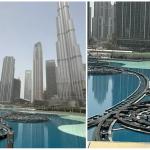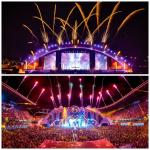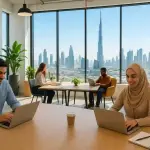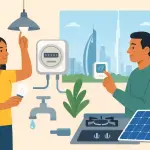Dubai, a city synonymous with gleaming skyscrapers, audacious architecture, and unparalleled luxury, thrives amidst a vast, arid desert. For centuries, water scarcity has been the desert's unyielding challenge, a formidable adversary to human settlement and progress. Yet, against all odds, Dubai has not only blossomed but has also cultivated an astonishingly green landscape, providing its millions of residents and visitors with abundant fresh water. This remarkable transformation isn't a mirage but a testament to relentless innovation, strategic foresight, and a pioneering spirit in water management.
This blog post delves into the hidden engineering marvels and ingenious strategies that allow Dubai to not just survive, but to truly thrive in an environment where every drop counts.
The Historical Challenge: A Land Thirsty for Life
Historically, the Arabian Peninsula relied on a precarious balance of scarce rainfall, limited groundwater, and traditional water harvesting methods like aflaj (ancient irrigation systems) and shallow wells. As Dubai began its rapid ascent from a humble trading port to a global metropolis in the latter half of the 20th century, the existing water infrastructure proved woefully inadequate to meet the burgeoning demands of a rapidly growing population and ambitious development projects. The sheer scale of urban expansion, coupled with the desire for verdant landscapes, pushed water resources to their absolute limit. It became clear that conventional methods would not suffice; a radical shift in strategy was essential for the city's very survival and future prosperity.
Desalination: Turning the Sea into a Lifeline
At the heart of Dubai's water strategy lies desalination – the process of removing salt and other minerals from seawater to make it potable. The UAE is a global leader in desalination, producing approximately 14% of the world's total desalinated water. Dubai Electricity and Water Authority (DEWA) alone operates some of the largest and most advanced desalination facilities on the planet.
Initially, thermal desalination technologies like Multi-Stage Flash (MSF) and Multiple-Effect Distillation (MED) were dominant. These methods involve boiling seawater and collecting the condensed vapor, often as a by-product of electricity generation. While effective, they are energy-intensive.
However, the major shift now is towards Reverse Osmosis (RO) technology. RO uses high pressure to force seawater through semi-permeable membranes that filter out salt and impurities. This method is significantly more energy-efficient and boasts a smaller carbon footprint compared to thermal desalination.
- Jebel Ali Desalination Complex: This colossal facility, owned and operated by DEWA, holds a Guinness World Record for being the largest single-site desalination complex globally, with a production capacity of 490 million imperial gallons per day (MIGD). It combines power generation with water desalination, increasingly integrating RO technology.
- Sustainability Focus: Dubai's Clean Energy Strategy 2050 is driving the push to power desalination plants with clean energy sources, primarily solar. Projects like the massive Taweelah plant in Abu Dhabi (one of the largest RO plants globally, producing 200 MIGD) are benchmarks for efficiency and lower environmental impact, significantly boosting clean water production with reduced energy consumption. By 2030, DEWA aims for RO to account for 42% of its total desalinated water production, up from 13%, highlighting the commitment to more sustainable processes.
Smart Water Networks: Eliminating Waste, Embracing Efficiency
Producing fresh water is only half the battle; getting it to homes and businesses without loss is equally critical. Dubai has invested heavily in smart water networks and digital solutions to minimize wastage.
- Smart Meters: DEWA has replaced all its mechanical water meters with smart ones, which are read and monitored remotely every 15 minutes. This real-time data allows both DEWA and customers to track consumption patterns.
- High Water Usage Alert System: An innovative feature of the smart meter system is the "High Water Usage Alert." If an unusual spike in consumption is detected, DEWA can send instant notifications to customers, allowing them to promptly identify and fix leaks in their internal connections. This proactive approach has already saved billions of liters of water by quickly addressing leaks that might otherwise go unnoticed for weeks or months.
- AI and Advanced Sensors: Beyond individual homes, AI and advanced sensors monitor the entire water network – pipelines, pumping stations, and reservoirs. DEWA's "Hydronet" project, for instance, leverages AI to remotely control and monitor the water network, predicting and spotting issues before they escalate into major problems. This real-time oversight has drastically reduced non-revenue water (water lost before it reaches the customer), making Dubai's water system one of the most efficient globally, with system losses slashed from 42% to a remarkable 4.6% by 2023.
The Unsung Hero: Advanced Wastewater Treatment and Reuse
Often overlooked, the sophisticated treatment and reuse of wastewater play a vital role in Dubai's water security strategy. Rather than simply disposing of wastewater, Dubai treats it to a high standard, transforming it into a valuable resource.
- Extensive Network: Dubai boasts an extensive and continually expanding sewage system, spanning over 1,200 kilometers of pipelines connected to major treatment facilities like the Al Awir Plant and Jebel Ali Plant, handling millions of cubic meters of wastewater daily.
- Tertiary and Advanced Treatment: The treatment process goes beyond basic primary and secondary stages, often incorporating tertiary and advanced filtration to remove nearly all pathogens and contaminants. The treated wastewater is safe for non-potable uses.
- Massive Reuse: A significant portion of treated wastewater (95% by 2036, according to the UAE Water Security Strategy) is repurposed for:
- Landscape Irrigation: Watering parks, golf courses, green spaces, and roadside plantings. This is a visible testament to Dubai's "green secret."
- District Cooling Systems: Used in large-scale air conditioning systems for commercial and residential developments.
- Industrial Processes: Supplying water for various industrial applications, reducing reliance on desalinated water.
- Environmental Impact: This reuse not only conserves desalinated water but also reduces the energy consumption and carbon emissions associated with further desalination, demonstrating a closed-loop approach to water management.
Cloud Seeding: Making the Skies Deliver
In an arid region where rainfall is naturally scarce, the UAE has invested heavily in cloud seeding – a weather modification technique aimed at increasing precipitation.
- Scientific Approach: The UAE Research Program for Rain Enhancement Science (UAEREP), launched in 2015, funds cutting-edge research to improve the accuracy and effectiveness of cloud seeding.
- Hygroscopic Seeding: The UAE primarily uses hygroscopic cloud seeding, involving aircraft or drones dispersing natural salts (like potassium chloride and sodium chloride) into clouds. These tiny particles act as condensation nuclei, encouraging water droplets to form and grow, thus enhancing the natural rain-making process.
- Impact: Studies, including the UAE Unified Aerosol Experiment (UAE2), have indicated an average increase of 23% in annual surface rainfall over seeded target areas. While the impact on large-scale weather events is debated by some meteorologists, it remains a consistent part of the UAE's strategy to augment its natural water resources.
Agricultural Innovation: Growing More with Less
Traditional agriculture is a major water consumer, a luxury a desert nation cannot afford. Dubai is addressing this through innovative farming techniques that drastically reduce water usage.
- Hydroponics: Growing plants without soil, using nutrient-rich water solutions. This method significantly cuts down on water consumption (up to 90% less than traditional farming). Emirates Hydroponics Farms, operating since 2005, is a pioneer in this field.
- Vertical Farming: Cultivating crops in vertically stacked layers, often indoors. This allows for year-round production, minimal land use, and highly controlled environments that optimize water use. Bustanica, located in Dubai, is the world's largest vertical farm, supplying fresh greens to local markets and even airlines with significantly reduced water footprints. These farms often use recycled water from HVAC systems and desalinated water more efficiently.
- Controlled Environment Agriculture (CEA): Utilizing advanced sensors, AI, and precise climate control to maximize yield while minimizing resource input, especially water.
Future-Proofing: AI, Research, and Strategic Reserves
Dubai's war against water scarcity is an ongoing battle, and the city continues to look to the future with innovative solutions.
- AI in Water Management: Beyond network monitoring, AI is being deployed for predictive analytics, forecasting water demand, optimizing desalination plant operations, and detecting anomalies in consumption patterns with even greater precision. DEWA's roadmap to becoming the world's first "AI-native utility" underscores this commitment, embedding AI across all operational and service processes.
- Strategic Water Reserves: Recognizing the importance of resilience, the UAE is building massive underground strategic water reserves. These facilities store vast amounts of desalinated water, providing a crucial buffer for emergency situations and ensuring continuous supply for up to 90 days.
- Global Collaboration and Research: The UAE actively collaborates with international partners and invests in global research initiatives, such as the Mohamed bin Zayed Water Initiative, to accelerate funding for sustainable desalination and water management technologies worldwide. This global perspective reflects Dubai's understanding that water security is a collective challenge.
Conclusion: A Blueprint for a Water-Secure Future
Dubai's journey from a thirsty desert outpost to a verdant global hub is an inspiring narrative of human ingenuity triumphing over environmental adversity. It's a testament to how audacious vision, massive investment in cutting-edge technology, and a commitment to sustainability can fundamentally alter the relationship between a city and its most precious resource.
The "Desert's Green Secret" isn't magic; it's a meticulously engineered ecosystem built on advanced desalination, smart distribution networks, comprehensive water recycling, targeted weather modification, and innovative agriculture. As the world grapples with increasing water stress due to climate change and population growth, Dubai's comprehensive, technology-driven approach offers a compelling blueprint for other arid regions, demonstrating that even in the harshest environments, a water-secure and green future is not just a dream, but an achievable reality.










